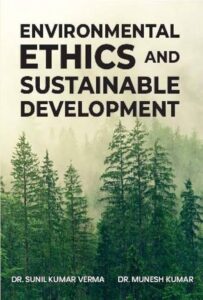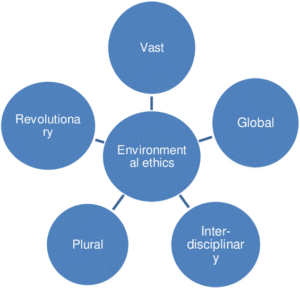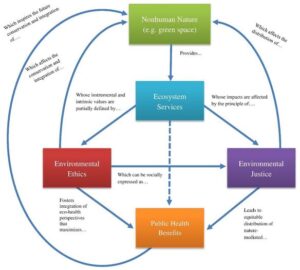Back to: Environmental Biology 300 Level
Welcome to class!
Imagine a world where everyone cuts down trees without planting new ones, dumps waste in rivers without concern, or uses up natural resources without thinking of future generations. That world wouldn’t last very long. This is why understanding environmental ethics and sustainable development is so important. These two concepts guide how we interact with nature responsibly today while ensuring that future generations can enjoy the same benefits we do.
Environmental Ethics And Sustainable Development
What is Environmental Ethics?
Environmental ethics is a branch of philosophy that deals with the moral relationship between humans and the environment. It helps us ask and answer questions like: Do animals have rights? Is it wrong to pollute a river just because it’s convenient? Should we destroy a forest for short-term gain?

In simple terms, environmental ethics teaches us to respect and protect the natural world because we are part of it and depend on it for survival.
Key Ethical Principles in Environmental Decision-Making
Respect for all life forms: Every plant, animal, and ecosystem has intrinsic value—not just what they can offer humans.
Intergenerational responsibility: We must care for the Earth not just for ourselves, but for those who will come after us.
Justice and equity: Environmental benefits and burdens should be shared fairly among all people, including the poor and vulnerable.
Sustainability: Use resources in a way that does not deplete them for future use.
What is Sustainable Development?
Sustainable development is the process of meeting human needs in ways that ensure environmental, social, and economic stability for present and future generations. It means growing in a way that doesn’t harm the planet.

The most widely accepted definition comes from the 1987 Brundtland Report: “Development that meets the needs of the present without compromising the ability of future generations to meet their own needs.”
Three Pillars of Sustainable Development
Environmental Sustainability – Protecting ecosystems, reducing pollution, conserving resources.
Social Sustainability – Promoting equality, community well-being, and cultural preservation.
Economic Sustainability – Supporting livelihoods and stable economic growth without harming nature.
Practical Examples in Nigeria
Promoting clean energy like solar panels in off-grid communities.
Encouraging organic farming to reduce pesticide use and protect soil.
Eco-tourism in areas like Obudu Cattle Ranch, which provides jobs while preserving the environment.
Community recycling initiatives in Lagos that convert waste into useful products.
Enforcing laws through agencies like NESREA to regulate industrial pollution.

Why It Matters in Nigeria
Nigeria faces environmental challenges like oil spills, deforestation, flooding, and poor waste management. Without ethical and sustainable practices, these problems will worsen and affect health, food supply, and economic stability. Environmental ethics shapes responsible behaviour, while sustainable development ensures long-term prosperity.
Summary
- Environmental ethics is about our moral duty to care for the environment and all living things.
- It includes principles like respect for life, fairness, sustainability, and intergenerational responsibility.
- Sustainable development means meeting present needs without harming future generations.
- The three pillars of sustainable development are environmental, social, and economic sustainability.
- In Nigeria, sustainable actions include eco-tourism, clean energy, organic farming, and proper waste management.
Evaluation
- What is environmental ethics, and why is it important?
- Mention and explain three principles of environmental ethics.
- Define sustainable development and state its official definition.
- List the three pillars of sustainable development and give an example of each.
- Identify three examples of sustainable development practices in Nigeria.
You are becoming a thoughtful environmental leader by learning how to make wise decisions for the planet and society. Your voice and actions matter, and Afrilearn is proud to walk with you on this journey. Keep going—you are doing great!
